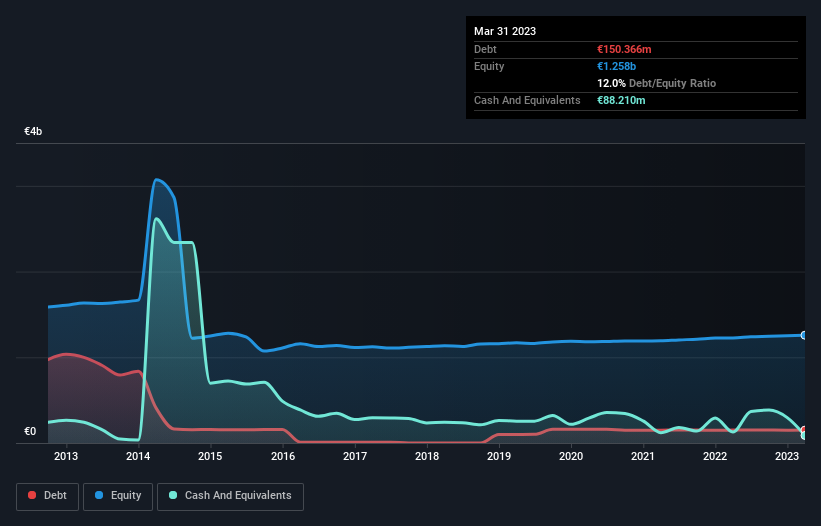- Germany
- /
- Healthcare Services
- /
- XTRA:RHK
Here's Why RHÖN-KLINIKUM (ETR:RHK) Can Manage Its Debt Responsibly

Howard Marks put it nicely when he said that, rather than worrying about share price volatility, 'The possibility of permanent loss is the risk I worry about... and every practical investor I know worries about.' So it might be obvious that you need to consider debt, when you think about how risky any given stock is, because too much debt can sink a company. Importantly, RHÖN-KLINIKUM Aktiengesellschaft (ETR:RHK) does carry debt. But should shareholders be worried about its use of debt?
When Is Debt Dangerous?
Generally speaking, debt only becomes a real problem when a company can't easily pay it off, either by raising capital or with its own cash flow. If things get really bad, the lenders can take control of the business. While that is not too common, we often do see indebted companies permanently diluting shareholders because lenders force them to raise capital at a distressed price. Having said that, the most common situation is where a company manages its debt reasonably well - and to its own advantage. When we examine debt levels, we first consider both cash and debt levels, together.
Check out our latest analysis for RHÖN-KLINIKUM
What Is RHÖN-KLINIKUM's Net Debt?
As you can see below, RHÖN-KLINIKUM had €150.4m of debt, at March 2023, which is about the same as the year before. You can click the chart for greater detail. However, it does have €88.2m in cash offsetting this, leading to net debt of about €62.2m.

How Strong Is RHÖN-KLINIKUM's Balance Sheet?
The latest balance sheet data shows that RHÖN-KLINIKUM had liabilities of €315.3m due within a year, and liabilities of €157.2m falling due after that. Offsetting these obligations, it had cash of €88.2m as well as receivables valued at €232.3m due within 12 months. So its liabilities outweigh the sum of its cash and (near-term) receivables by €152.1m.
Of course, RHÖN-KLINIKUM has a market capitalization of €863.5m, so these liabilities are probably manageable. But there are sufficient liabilities that we would certainly recommend shareholders continue to monitor the balance sheet, going forward.
We measure a company's debt load relative to its earnings power by looking at its net debt divided by its earnings before interest, tax, depreciation, and amortization (EBITDA) and by calculating how easily its earnings before interest and tax (EBIT) cover its interest expense (interest cover). The advantage of this approach is that we take into account both the absolute quantum of debt (with net debt to EBITDA) and the actual interest expenses associated with that debt (with its interest cover ratio).
RHÖN-KLINIKUM's net debt is only 0.61 times its EBITDA. And its EBIT covers its interest expense a whopping 23.4 times over. So you could argue it is no more threatened by its debt than an elephant is by a mouse. Also positive, RHÖN-KLINIKUM grew its EBIT by 23% in the last year, and that should make it easier to pay down debt, going forward. The balance sheet is clearly the area to focus on when you are analysing debt. But you can't view debt in total isolation; since RHÖN-KLINIKUM will need earnings to service that debt. So if you're keen to discover more about its earnings, it might be worth checking out this graph of its long term earnings trend.
Finally, a company can only pay off debt with cold hard cash, not accounting profits. So we always check how much of that EBIT is translated into free cash flow. In the last three years, RHÖN-KLINIKUM created free cash flow amounting to 5.3% of its EBIT, an uninspiring performance. That limp level of cash conversion undermines its ability to manage and pay down debt.
Our View
Happily, RHÖN-KLINIKUM's impressive interest cover implies it has the upper hand on its debt. But we must concede we find its conversion of EBIT to free cash flow has the opposite effect. It's also worth noting that RHÖN-KLINIKUM is in the Healthcare industry, which is often considered to be quite defensive. Taking all this data into account, it seems to us that RHÖN-KLINIKUM takes a pretty sensible approach to debt. While that brings some risk, it can also enhance returns for shareholders. When analysing debt levels, the balance sheet is the obvious place to start. But ultimately, every company can contain risks that exist outside of the balance sheet. For example - RHÖN-KLINIKUM has 1 warning sign we think you should be aware of.
Of course, if you're the type of investor who prefers buying stocks without the burden of debt, then don't hesitate to discover our exclusive list of net cash growth stocks, today.
New: AI Stock Screener & Alerts
Our new AI Stock Screener scans the market every day to uncover opportunities.
• Dividend Powerhouses (3%+ Yield)
• Undervalued Small Caps with Insider Buying
• High growth Tech and AI Companies
Or build your own from over 50 metrics.
Have feedback on this article? Concerned about the content? Get in touch with us directly. Alternatively, email editorial-team (at) simplywallst.com.
This article by Simply Wall St is general in nature. We provide commentary based on historical data and analyst forecasts only using an unbiased methodology and our articles are not intended to be financial advice. It does not constitute a recommendation to buy or sell any stock, and does not take account of your objectives, or your financial situation. We aim to bring you long-term focused analysis driven by fundamental data. Note that our analysis may not factor in the latest price-sensitive company announcements or qualitative material. Simply Wall St has no position in any stocks mentioned.
About XTRA:RHK
RHÖN-KLINIKUM
Offers in-patient, semi-patient, and outpatient healthcare services in Germany.
Flawless balance sheet with solid track record.
Similar Companies
Market Insights
Community Narratives




